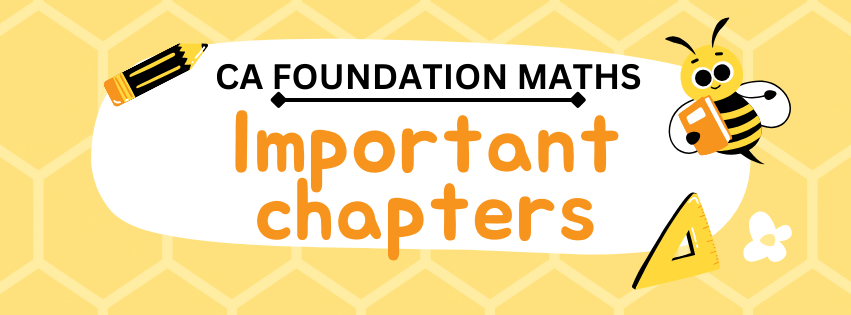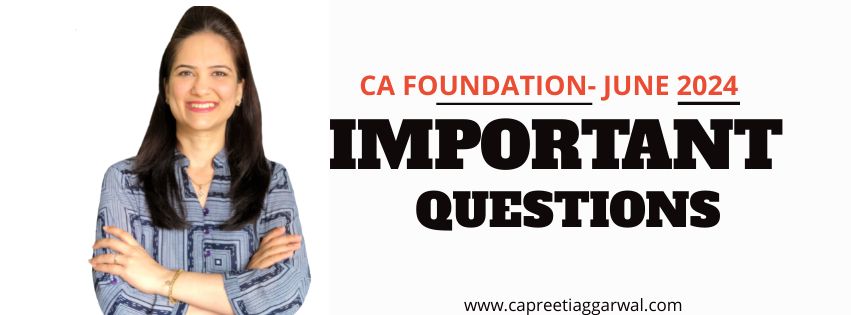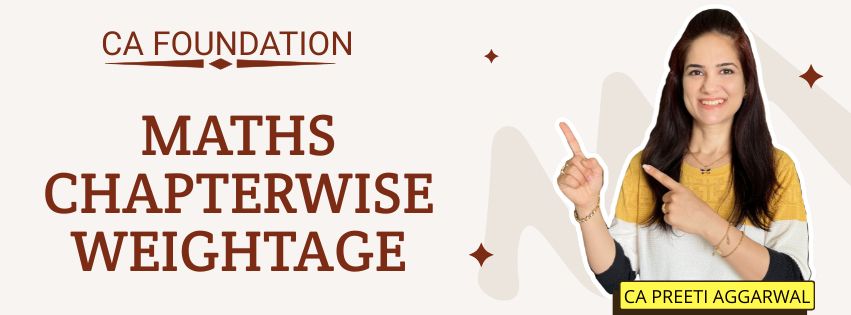CA Foundation Law (June 2024 Question Paper)

CA Foundation – June 2024 Exam Paper (100 marks)
Question No 1 is compulsory
Answer any Four questions from the remaining five questions
Q1) (a) R owns an electronics store. P visited the store to buy a water purifier priced at ₹54,000/-. He specifically requested R for a purifier with a copper filter. As P wanted to buy the purifier on credit, with the intention of paying in 9 equal instalments, R demands a guarantor for the transaction. S (a friend of P) came forward and gave the guarantee for payment of water purifier. R sold P, a water purifier of a specific brand. P made payment for 4 monthly instalments and after that became insolvent. Explain with reference to the Indian Contract Act, 1872, the liability of S as a guarantor to pay the balance price of water purifier to R. What will your answer, if R sold the water purifier misrepresenting it as having a copper filter, while it actually has a normal filter? Neither P nor S was aware of this fact and upon discovering the truth, P refused to pay the price. In response to P’s refusal, R filed the suit against S, the guarantor. Explain with reference to the Indian Contract Act, 1872 whether S is liable to pay the balance price of water purifier to R? (7 marks)
(b) A company, ABC Limited as on 31.03.2023 had a paid-up capital of ₹1 lakh (10,000 equity shares of ₹10 each). In June 2023, ABC Limited had issued additional 10,000 equity shares of ₹10 each which was fully subscribed. Out of 10,000 shares, 5,000 of these shares were issued to XYZ Private Limited company. XYZ is a holding company of PQR Private Limited by having control over the composition of its Board of Directors.
Now, PQR private limited claims the status of being a subsidiary of ABC Limited as being a subsidiary of its subsidiary i.e. XYZ private limited. Examine the validity of the claim of PQR private limited.
State the relationship if any, between ABC Limited and XYZ Private Limited as per the provisions of the Companies Act, 2013. (7 marks)
(c) The Indian Partnership Act does not make the registration of firms compulsory, yet the consequences or disabilities of non-registration have a persuasive pressure for their registration. Still, there are some cases where non-registration of firm does not affect certain rights. Explain with reference to the provisions of the Indian Partnership Act, 1932. (6 marks)
Q2) (a) Sony, a friend of Priya wanted to buy her two-wheeler. Priya agreed to sell her two-wheeler. Priya agreed to sell her two-wheeler to Sony and it was decided that price of her two-wheeler will be fixed by Priya’s father, who is an auto dealer. Priya immediately handed over the keys to Sony. However, Priya’s father refused to fix the price as he did not want Priya to sell her vehicle. Priya expressed her inability to sell the two-wheeler to Sony and asked for return, but Sony refused to return the same. Explain-
(i) Can Priya take-back the vehicle from Sony?
(ii) Will your answer be different, if Priya had not handed over the vehicle to Sony? (3 marks)
(b) Ram want to incorporate a company in which he will be the only member. According to the provisions of the Companies Act, 2013, what type of company can be incorporated? What are the salient features of this type of company? (7 marks)
(c) A LLP is a new form of legal business entity with limited liability. It’s an alternative corporate business vehicle that only gives the benefits of limited liability at low compliance cost but allows its partners the flexibility of organizing their internal structure as a traditional partnership. Keeping in view of above, define the following characteristics of LLP.
(i) Body Corporate (ii) Mutual Agency (iii) Foreign LLPs (iv) Artificial Legal person (6 marks)
Q3) (a) (i) P, Q, R formed a partnership agreement to operate motor buses along specific routes for a duration of 12 years. After operating the business for four years, it was observed that the business incurred losses each year. Despite this, P is determined to continue the business for the remaining period. Examine with reference to the Indian Partnership Act, 1932, can P insist to continue the business? If so, what options are available to Q and R who are reluctant to continue operating the business? (4 marks)
(ii) A and B operate a textile merchant business in partnership. Mr. A finances the business and is a sleeping partner. In the regular course of business, B acquires certain fabric goods belonging to C. However, B is aware that these goods are stolen goods. Moreover, B records proceeds from these sales in the firm’s books. Now, A wants to avoid the liability towards C on the grounds of misconduct by B. In the light of the provisions of the Indian Partnership Act, 1932 discuss the liability of A and B towards C. (3 marks)
(b) (i) XYZ is a company incorporated under the Companies Act, 2013. The paid-up share capital of the company is held by others as on 31.03.2024 is as under:
(1) Government of India 20%
(2) Life Insurance Corporation of India (Public Institution) 8%
(3) Government of Tamil Nadu 10%
(4) Government of Rajasthan 10%
(5) ABC Limited (owned by Government Company) 15%
As per above shareholding, state whether XYZ Limited be called a government company under the provisions of the Companies Act, 2013. (4 marks)
(ii) M and N holding 70% and 30% of the shares in the company. Both died in an accident. Answer with reference to the provisions of the Companies Act, 2013, what will be the legal effect on the company as both the members have died? (3 marks)
(c) Explain in brief with reference to the provisions of the Indian Contract Act, 1872, what are the rights enjoyed by surety against the Creditor, the Principal Debtor and Co- sureties? (6 marks)
Q4) (a) (i) Mr. J entered into an agreement with Mr. S to purchase his house for ₹20 lakh, within three months. He also paid ₹50,000/- as token money. In the meanwhile, in an anti-encroachment drive of the local administration, Mr. S’s house was demolished. When Mr. J was informed about the incident he asked for refund of token money.
Referring to the relevant provisions of the Indian Contract Act, 1872 state whether Mr. J is entitled to the refund of the amount paid. (4 marks)
(ii) Rama directs Shyam to sell laptops for him and agrees to give Shyam eleven percent (11%) commission on the sale price fixed by Rama for each laptop. As Government of India put restrictions on import of laptops, Rama thought that the prices of laptops might go up in near future and he revokes Shyam’s authority for any further sale. Shyam, before receiving the letter at his end, sold 5 laptops at the price fixed by Rama. Shyam asked for 11% commission on the sale of 5 laptops for ₹1 lakh each.
Explain under the provisions of the Indian Contract Act, 1872:
(1) Whether sale of laptops after revoking Shyam’s authority is binding on Rama?
(2) Whether Shyam will be able to recover his commission from Rama, if yes, what will be the amount of such commission? (3 marks)
(b) A promissory note, payable at a certain period after sight, must be presented to the maker thereof for payment. Under which scenarios presentment for payment is not necessary and the instrument is dishonoured at the due date for presentment according to the provisions of the Negotiable Instrument Act, 1881? (7 marks)
(c) Describe in brief about the following Regulatory bodies of the Government of India:
(i) Securities Exchange Board of India
(ii) Reserve Bank of India
(iii) Insolvency and Bankruptcy Board of India (6 marks)
Q5) (a) PTC Hotels in Bombay decided to sell their furniture by auction sale. For this purpose, they appointed RN & Associates as auctioneer. They invited top ten renowned Architects in Bombay for bidding. A right to bid was not notified by them. Furniture was put up in lots for sale. It was decided that for every lot of furniture there will be a reserve price. On 25th Feb 2024, auction sale was started at 10 am in the lawn of PTC Hotels Bombay. For a special lot of furniture three parties came for bidding. Mr. Neel, Mr. Raj and Mr. Dev on behalf of their respective companies. Bidding was as follows: (7 marks)
Mr. Neel ₹5.70 lakh
Mr. Raj ₹ 4.85 lakh
Mr. Dev ₹ 6.10 lakh
The sale was completed in favour of Mr. Neel by RN & Associated by fall of hammer. Mr. Dev’s bid was rejected on ground that right to bid was reserved and company of Mr. Dev was not invited to bid.
For another bid of Italian Furniture was made by two parties as follows:
Mr. Dheer ₹ 15 lakh
Mr. Madhu (on behalf of R N & Associates) ₹ 15.2 lakh
Sale was completed in favour of Mr. Dheer instead of Mr. Madhu
Mr. Dev and Mr. Madhu argued that auction sale was not lawful. Give your opinion with reference to provisions of the Sale of Goods Act, 1930 whether Auction Sale will be considered lawful or not?
(b) “Dissolution of partnership doesn’t mean dissolution of firm.” Do you agree with this statement? State any three situations where court can dissolve the partnership firm. (7 marks)
(c) “Where a party to a contract refuses altogether to perform, or is disabled from performing his part of it, the other party has a right to rescind it.” Discuss this statement and the effects of such refusal under the provisions of The Indian Contract Act, 1872. (6 marks)
Q6) (a) Mr. Y issued a cheque for ₹10,000 to Mr. Z which was dishonoured by the Bank because Y did not have enough funds in his account and has no authority to overdraw. Examine as per the provisions of the Negotiable Instruments Act, 1881, whether- (7 marks)
(i) Mr. Y is liable for dishonour of cheque, if yes, what are the consequences for such an offence?
(ii) What would be your answer if Y issued a cheque as a donation to Mr. Z?
(b) Explain the term wagering agreement in the light of the Indian Contract Act, 1872. Also, explain some transactions resembling with wagering transaction but which are not void. OR
What is the meaning of contingent contract? Write briefly its essentials. Also, explain any three rules relating to enforcement of a contingent contract. (6 marks)
(c) J, a wholesaler of premium Basmati rice delivered on approval 100 bags of rice of 10 kg each to a local retailer, on sale or returnable basis within a month of delivery. The next day the retailer sold 5 bags of rice to a regular customer K. A week later K informed the retailer that the quantity of rice was not as per the price.
The retailer now wants to return all the rice bags to J, including the 4 bags not used by K. Can the retailer do so?
Also briefly describe the provisions underlying in this context of the Sale of Goods Act, 1930. (7 marks)
CA Foundation Business Laws (100 Marks)












